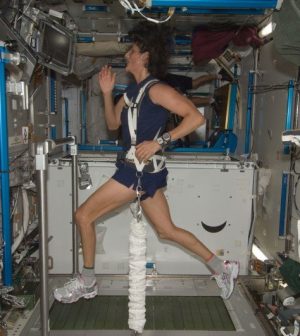- Could Your Grocery Store Meat Be Causing Recurring UTIs?
- Are You Making This Expensive Thermostat Error This Winter?
- Recognizing the Signs of Hypothyroidism
- 10 Strategies to Overcome Insomnia
- Could Artificial Sweeteners Be Aging the Brain Faster?
- Techniques for Soothing Your Nervous System
- Does the Water in Your House Smell Funny? Here’s Why
- Can a Daily Dose of Apple Cider Vinegar Actually Aid Weight Loss?
- 6 Health Beverages That Can Actually Spike Your Blood Sugar
- Treatment Options for Social Anxiety Disorder
One Gender Loses More Muscle During Space Flight

Women are more likely to lose more muscle mass during space flight than men, a new lab study suggests.
Females participating in the extended bed rest study lost more leg muscle mass at two months than the men had lost at three months, results show.
The findings “suggest that women are more susceptible to weightlessness-induced muscle atrophy,” researchers concluded in their report published recently in the Journal of Applied Physiology.
NASA’s decision to diversify space crews in future spaceflight missions means that more women will be subject to the rigors of weightlessness, researchers said in background notes.
For example, the agency intends to send the first woman to the moon in 2024, researchers said.
To see how space travel might affect health, researchers recruited a group of people to spend extended periods in bed.
Men spent 90 days and women 60 days in a bed tilted 6 degrees head down, placing their head below their feet. This simulates the weightlessness experienced while traveling through space, researchers said.
Both volunteer groups ate, slept, cleaned up, and performed all other activities in either a head-down tilt or a horizontal position.
MRI screenings of the volunteers’ thigh and calf muscles taken before, during and after the trial showed that all participants lost a significant amount of muscle mass in both areas of the leg, the researchers said.
However, women tended to lose muscle mass more quickly than men.
For example, women lost more muscle from their quadricep thigh muscles than men by the one-month mark, researchers said.
The leg muscles were chosen “because they are critical for ambulation [walking] and extravehicular activities that likely will be required of space crews visiting the moon or Mars,” the researchers explained in a journal news release.
However, researchers are also concerned that the loss of muscle mass could have a more profound effect on crew members’ overall health.
“It is now established that muscle serves as an endocrine [hormonal] organ, communicating with numerous other organs,” the research team wrote.
Given these differences, researchers said it is imperative to perform more bed rest studies to better understand the gender-specific health effects of space flight.
Future space missions are expected to last much longer than this study, and this data could arm NASA with what it needs to protect the health of crew members, the researchers added.
Previous studies have shown that women’s bodies are very responsive to exercise during simulated weightlessness, researchers said. If that is so, an exercise plan could counteract the effects of space travel.
More information
NASA has more about space travel and the human body.
SOURCE: American Physiological Society, news release, Dec. 19, 2023
Source: HealthDay
Copyright © 2026 HealthDay. All rights reserved.










